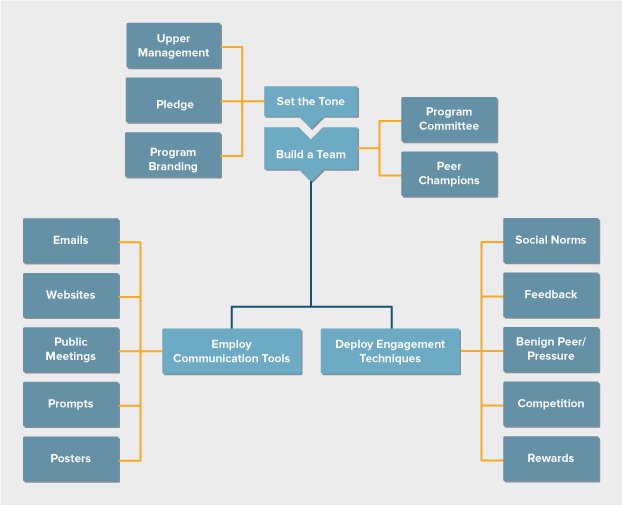Feedback measures aim to increase end users’ awareness and transparency about their own levels of energy consumption. Combined with the emphasis on the impact of user behaviour on the energy performance of a building, feedback and other measures can motivate users to change their behaviour, but also to invest in energy saving technologies. They have been implemented at trans-national, national, regional, and local levels all over the world.
Feedback and other measures targeting behaviour cover a range of practices, including individual metering, smart metering with feedback on tips where to save, and informative/comparative billing as well as prompts, motivation campaigns for behaviour change with practical tips for energy-efficient user behaviour and its potential energy and cost savings, energy saving competitions, and training for users (mainly in the service sector). The illustration below shows how an Energy Behaviour Programme at the workplace could be set up, and which are the strategies and tools to be used for encouraging employees to change their energy using behaviour.
Strategies for developing an Energy Behaviour Programme in the workplace

Source: ACEEE 2012
The feedback and behavioural measures work more effectively for encouraging users’ energy saving behaviour and uptaking of energy efficiency technologies when they are combined with other instruments such as: energy advice & assistance during design and construction, other legal requirements such as regulations on individual and possibly smart metering (including setting obligations for responsible actors, addressing privacy protection, and protecting consumers from unjustified energy rate increases ), minimum energy performance standards, mandatory comparative labelling schemes for appliances, mandatory energy performance certificates & equipment labels for buildings, financial incentives, etc.
Experience in many countries, including recent reviews on feedback programmes in the USA and Canada, show electricity and fuel savings in the range of 5% to 15%. Given their potential of changing users’ behaviour, feedback and other measures on behaviour can be cost-effective. However, for the deployment of new technologies such as smart meters, its cost-effectiveness still needs to be carefully assessed considering the conditions in different countries. Furthermore, the danger of snap-back effects is particularly high for this type of measure: energy savings will be lost, if users fall back to previous, less energy-efficient behaviour and routines. Feedback and other measures therefore often need to be continued or repeated to secure the savings.